Yeah, yeah, welcome back to another ILTBTA, whatever. Okay, kid, you wanna learn about the newspaper? How to be a real newsman, dig? Well, see, this little number may be self-described as in a “mythical kingdom,” but these boys will give you the straight skinny: how to find a story, how to chase a source, rake the muck, and how to spin a long yarn full of lies when all else fails. You’re a newsman now, get it?? Now get out there and get that scoop on The Front Page!
*chomps cigar*
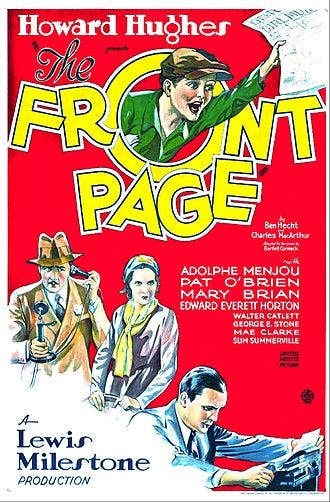
Previews
What, if anything, did we know about this coming attraction before we watched it?
Ellen: I’ve never heard of this, but when I was researching, I came across a lot of folks asserting that the remake, His Girl Friday, is far superior. And I’ve at least heard my beloved Gilmore Girls reference that one!
Tyler: I shouldn’t be surprised but there is a whole Tumblr account dedicated to the movie references in Gilmore Girls. Was this your ILTBTA origin story?! But yea I know nothing about this movie, though I have to imagine that between the title and era it came out that it has to do with a newspaper in some capacity.
Plots & Feelings
This one’s pretty self-explanatory.
Short Version (courtesy of IMDb): A crusading newspaper editor tricks his retiring star reporter into covering one last case.
Long Version (modified from Wikipedia and formatted to fit your screen):
In an unnamed large city, a room full of reporters from various newspapers are annoyed by the loud thumping going on from across the street. The irony is, that noise is also why they’re there: the city is testing out its gallows in anticipation of hanging Earl Williams, and these men are all there to cover the story. Earl lost his job and was down on his luck, his only friend in the world a working girl named Molly Malloy (whom he only met once and they didn’t 👀👀, but she was kind to him). According to his murder conviction, the very next day he shot and killed a Black police officer. Part of the reporters’ interest is that his execution keeps getting delayed until closer and closer to the upcoming election for both sheriff and mayor, and the Black vote is very important in this town…
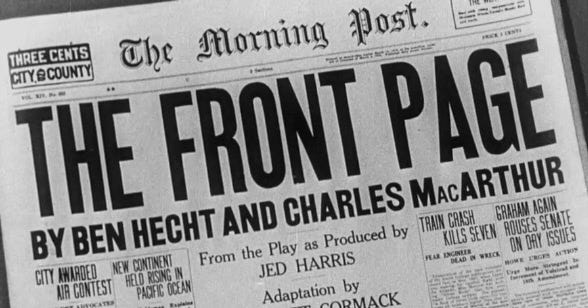
For their part, Sheriff Hartman and Mayor What’s-His-Face1 swear up and down that this is simply the course of carrying out justice. Behind closed doors, naturally, the Sheriff has been trying to drum up a phony “red scare” angle to the case, and they both conspire to stop a reprieve from the governor! They send the man who delivers it, Endicott, off to a house of ill repute with a bribe in hand. Pillars of the community!
Tyler: To this movie’s credit, I kind of let a lot of this early exposition and world-building wash over me because I didn’t expect any level of depth from a movie about these yahoos. Was I also heavily distracted by the mouse in our house? Who’s to say. (Me, I’m to say, the answer is a resounding yes.)
In the midst of all of this, star reporter of the Morning Post Hildebrand "Hildy" Johnson is over the moon, because he’s getting married! He plans to hop a train to New York City with his fiance Peggy Grant and her mother and start a new life as a “real person” working in advertising. His editor Walter Burns is somewhat less than thrilled. He wants Hildy to cover the Earl Williams story, and he eventually gets Hildy to talk to him by luring him to a location with a false fire! The ambulance-chaser instincts are simply too strong. Peggy waits in a cab while Hildy heads to the newsroom to say bye to the boys, who are all busily making up their own versions of Williams’ last night on Earth, complete with wildly different but deeply specific last meals.
Tyler: Maybe it was a different time, but I don’t understand why Hildy feels compelled to quit just because he's getting married. Is he just using that as an excuse to move and quit this job? We learn later that there’s some tension between Hildy and Peggy over his devotion to this job (and an advertising job waiting for him in New York paying “150 smackers a week”), but I feel like it would’ve made more sense to explain his rationale a little sooner.
Tyler: In the first conversation we see him having with Peggy, Hildy also references “the night you said no,” which is a juicy little tidbit of gossip that implies that Peggy denied his first marriage proposal!
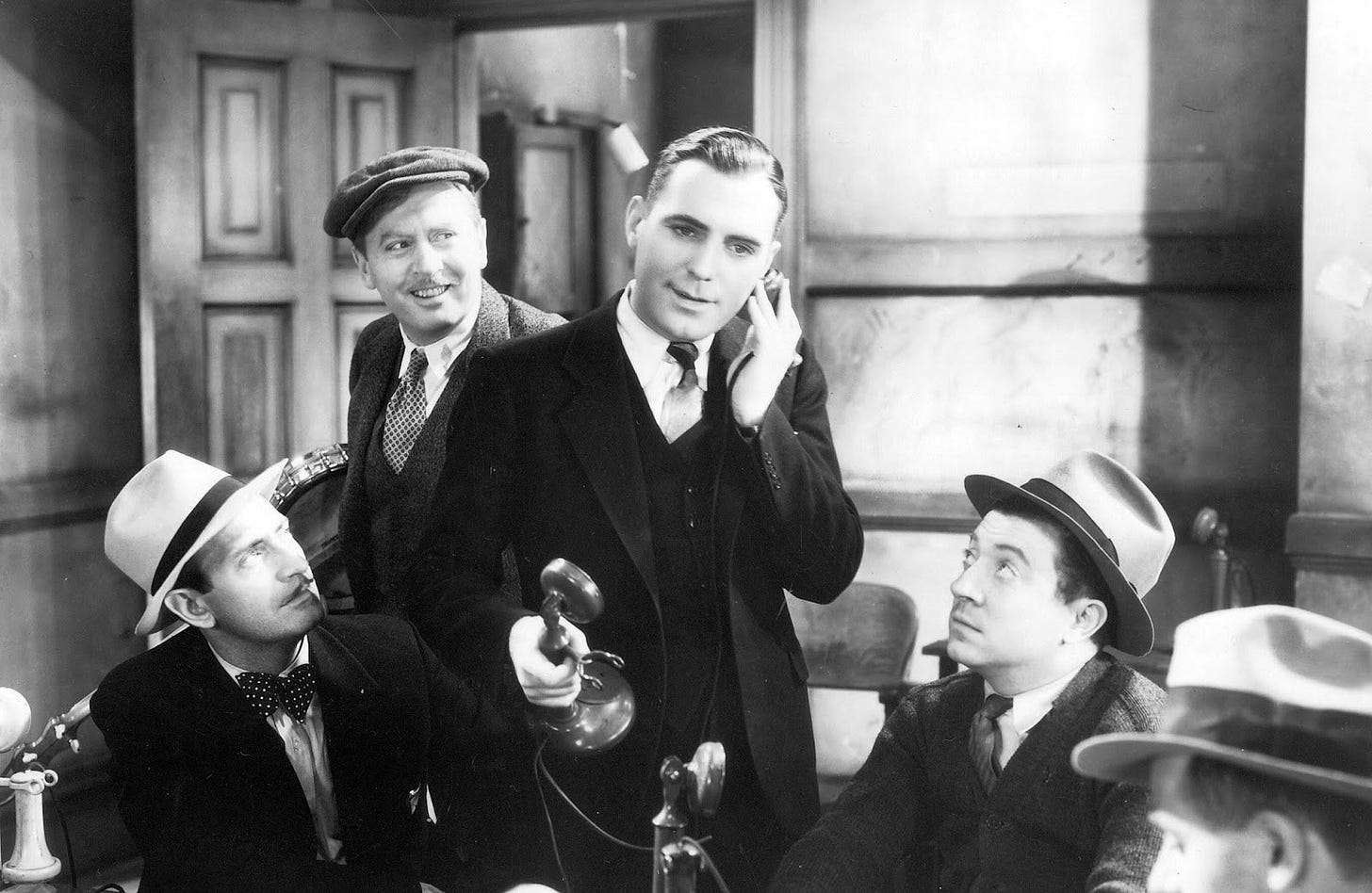
Meanwhile at the “death house,” Williams is being interviewed by yet another alienist2. Williams insists that, though he’s an anarchist3 (but in like, a chill way), he didn’t know what he was doing when he shot the officer. The doctor is there to determine if Williams is sane, and it’s possible the doctor may not be, because he hands Williams the Sheriff’s loaded gun for use in a crime reenactment and is promptly shot! The street outside erupts in gunfire as the newsmen erupt out of their clubhouse to chase down the story, Hildy among them. He uses most of his and Peggy’s life savings ($4604) to bribe a cop to tell him the story of Williams’ escape. Hildy hustles right back to the newsroom to call Burns with the scoop, completely caught up in the thrill of breaking news.
Ellen: While the Wikipedia summary asserts that there are suggestions that Williams is actually innocent, nothing in the story conveyed that to me, but rather that his case was being exploited by the political powers that be. And don’t worry, not a single one of these so-called reporters concerns themselves with getting to the bottom of that, so we’ll never know.
Tyler: Maybe that aspect of the plot got streamlined from the source material, but I agree: having (at least some) ambiguity in whether or not Williams is innocent would’ve added an interesting wrinkle to the plot. Though he did shoot that alienist so …
While Hildy is alone in the newsroom because all the other guys are reporting half-truths on the manhunt, whomst should drop in through the window but Williams! He used all the bullets in the gun and is a small fella, so Hildy easily hides him in a closet and then a rolltop desk. He ends up talking on the phone simultaneously to Burns and Peggy, telling his boss the truth to get him down there, and telling his betrothed the truth to explain why he can’t go just yet. Hildy’s future mother-in-law isn’t having it, and she bursts in to try to understand why her daughter has been abandoned in a cab. Burns has his greasy fixer straight up kidnap her to make sure she doesn’t squeal about Williams.
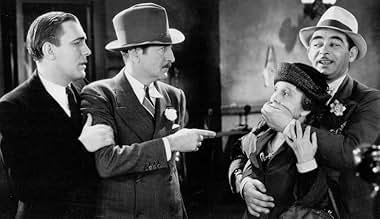
Molly comes in, sees Williams, and vows to help. The other reporters burst through the door, angry that Hildy locked it. They decide that if anyone knows where Williams is, it’d be Molly. Incidentally, they were absolutely horrible to her in an earlier scene, making glib jokes about Williams’ upcoming demise, so she’s not exactly inclined to help. They hound her, literally closing in and grabbing her, so she JUMPS. OUT. THE. WINDOW!
Ellen: There’s far too many sexist things in this movie to point out all of them, but the speed with which the reporters get back to their stories after their tactics caused a woman to jump to her apparent death is, obviously, the most egregious. To add insult to injury, she isn’t even mentioned in the Wikipedia summary!
Tyler: She is also the only one in this entire movie who takes them to task (or even mentions!) their rumor-mongering and sensationalist approach to journalism, making her the unlikely conscience of the movie. Taking that further, it’s quite telling that the conscience ends up killing herself.
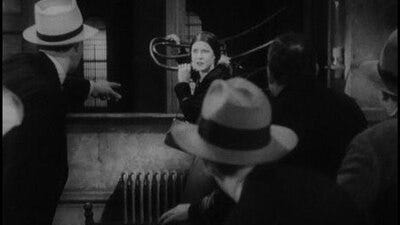
Hildy has the grace to be horrified by Molly’s final act, but Burns manages to get his mind back on the story and the glory of the Morning Post embarrassingly quickly. The two set about writing the story that will give the Post all the credit and smear the Sheriff and the Mayor into oblivion. Hildy is typing feverishly5 while Burns bribes the reporter who owns the desk to leave with the promise of a phony job. The only thing that can really stop Hildy is when Burns’ fixer returns, looking much worse for wear. The cab that he dragged Mrs. Grant into was in a horrible accident with police cars on the hunt for Williams. He doesn’t know if the woman is alive because he ran. This is finally the last straw for Hildy.
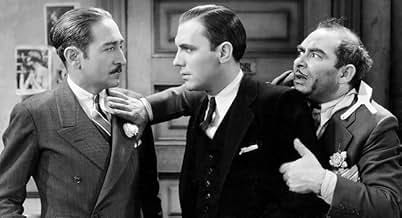
Hildy desperately tries to call hospitals to see if Mrs. Grant is there, while Burns calls everyone he’s ever met to try and get a team of guys to move the desk with Williams inside. Eventually, the gaggle of reporters return with the Mayor and the Sheriff and accuse Hildy and Burns of hiding a fugitive. What’s more, Mrs. Grant returns, disheveled and furious, pointing to Burns as the one who ordered her kidnapping. Williams is revealed to be in the desk, and it’s all looking pretty bad for our boys from the Morning Post until… the return of Endicott! You remember Endicott, from the second bullet? (Tyler: Gonna be honest, I barely did.) He returns, drunk as a skunk, and declares he cannot take a bribe to not deliver the reprieve from the governor. The Mayor throws the Sheriff directly under the bus, the reporters look as though Christmas has come early, and Williams is returned to custody while Hildy and Burns are released from it.
Despite offers of a promotion at the Morning Post from Burns, Hildy maintains that he is retiring. Peggy is finally allowed upstairs to meet and say farewell to the man who kidnapped her mother, worked her fiance like a dog, and did his very best to derail her impending marriage. She is much nicer than she needs to be, especially when Burns asks Hildy’s permission (not hers, of course) and proceeds to kiss her on the lips. Ew. No. Bad!
Anyway, Burns seems to accept their decision gracefully, even giving Hildy his prized gold watch as a thank-you gift for his services as a star reporter for the Morning Post. However, moments after the couple departs for the railroad station, Burns arranges for the police to arrest Hildy at the train's first stop on the pretense that Hildy has stolen his watch!
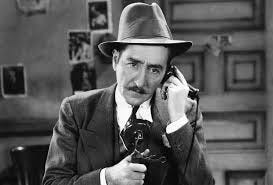
Intermission
Even though ILTBTA is free, please indulge us further and enjoy this quick “advertisement.”
This installment of ILTBTA is brought to you by … the New York City Tourism Board!
Are you looking to leave your drab city behind, a city so boring it’s not even named? Well make the leap to New York City!
Here we have plenty of space and lots of housing available and it’s definitely not run by rats! Enjoy our world-class cuisine like the Olive Garden in Times Square or grab a New York slice at local favorite, Sbarro! And when you’re done, just throw your trash on the street, it’s that easy! Walk off your meal by taking a stroll through Central Park, a park I once heard was the size of Connecticut so it must be true. You can feel completely safe walking our pristine streets knowing that a former cop is the mayor and definitely doesn’t have time to do anything corrupt, he told me himself!
Scream “ILTBTA” at a taxi as you’re crossing the street and receive a million free subway tokens. Those ILTBTA guys are the greatest, I heard they won like 92 Oscars or something. Incredible.
Try New York City today!
(Note: This ad was written by former newspaperman Hildy Johnson, our new advertising executive. He’s still getting the hang of this whole advertising thing and tends to get a bit sensationalist, so take it easy on him.)
Wiki-Wiki-Whaaat?
Love a good Wikipedia rabbit hole in search of some fun facts? Us too.
The Front Page’s Wikipedia page has some interesting facts and anecdotes that we recommend you read through, but here are a few of our favorites:
Like many movies we watch from the 1930s, The Front Page was adapted from a popular comedic play of the same name. The play was very well-received and influential, particularly its “plotting and rapid-fire, streetwise dialogue.”
The newspapers were modeled after ones in Chicago where the play’s writers (Ben Hecht and Charles MacArthur) worked, as well as one owned by William Randolph Hearst. The character of Walter Burns is apparently a thinly-veiled caricature of one of Hearst’s editors, Walter Howey. Random fun fact about Howey: he developed a sound photo system that could transmit photographs by wire.
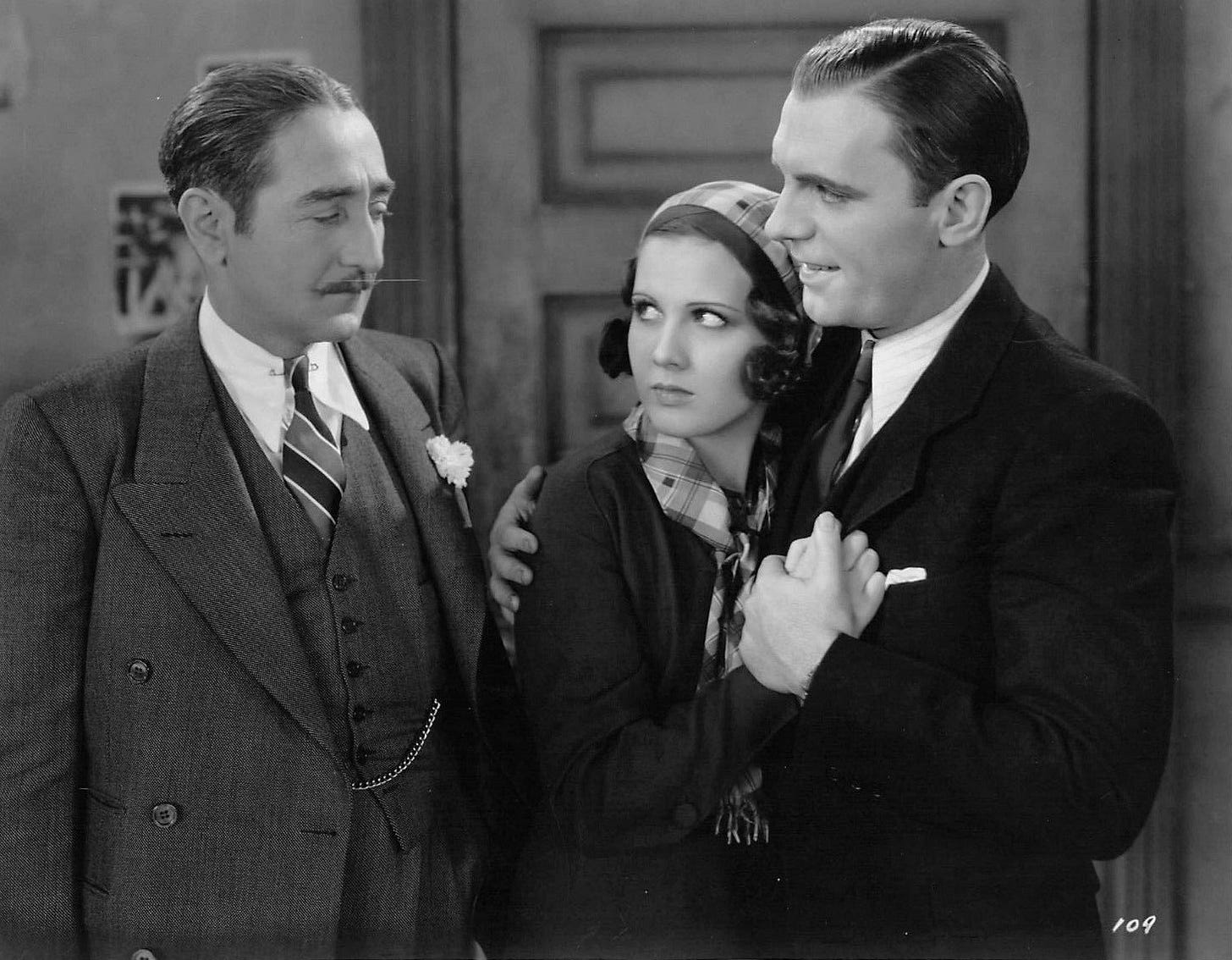
Other film adaptations of the story include His Girl Friday (1940) starring Cary Grant and Rosalind Russell, which changes Hildy to a woman that Walter is trying to win back both professionally and romantically; a 1974 remake of the same name directed by Billy Wilder (whom we met in our post on Double Indemnity) and starring Jack Lemmon, Walter Matthau, and Susan Surandon; and the 1988 comedy Switching Channels, which updated the story for the television era and starred Kathleen Turner (of Prizzi’s Honor infamy) and Burt Reynolds.
Ellen: I’m currently out on assignment in Houston, so I decided to watch the 1940 His Girl Friday on Saturday. I definitely enjoyed it more than its predecessor. Hildy is still a hard-nosed reporter but she has some actual compassion and other redeeming qualities, and while the sexism is dialed down from this version, don’t you worry: it’s still alive and well in the 40s!
The corrupt mayor is partly based on Chicago Mayor William Hale “Big Bill” Thompson, whom historians rank as one of the most unethical mayors in American history, mostly due to his open alliance with Al Capone.
The Front Page was produced by “the 20th century’s version of Elon Musk” Howard Hughes (whom we met in The Aviator), along with earlier ILTBTA post The Racket.
Adolphe Menjou, who was nominated for Best Actor for his role as editor Walter Burns, was a silent movie star known for his suave style, which earned him the title of Best Dressed Man in America nine times.
Menjou was nominated alongside Jackie Cooper, who was just nine years old when he earned a nomination for his work in Skippy. During the ceremony, Cooper apparently fell asleep on the shoulder of Best Actress winner Marie Dressler and was placed into his mother’s lap when Dressler got up to accept her award.
Menjou’s mustache became “a symbol for the resourceful criminal,” and in German is still called “Menjou-Bärtchen” after his public support of HUAC drew the attention of the East German propaganda department.
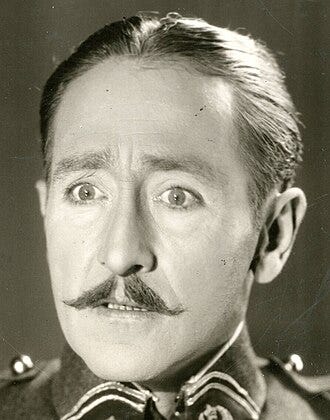
Menjou also starred in the 1937 adaptation of A Star Is Born and the 1933 film Wife Beware, which was the first film ever shown at a drive-in (a theatre in Camden, NJ).
Eagle-eyed ILTBTA fans will recognize Edward Everett Horton, who played germaphobe reporter Roy Bensinger (whose desk Williams hides in), from his roles in past ILTBTA posts: he played Horace Hardwick in Top Hat and Lovett in Lost Horizon. His Wikipedia page notes that he typically played “a mousy fellow who put up with domestic or professional problems to a certain point and then finally asserted himself for a happy ending.”
Tyler: In perusing his Wikipedia filmography section it seems he was in quite a few Best Picture nominees, so I reserve the right to re-use this fact in future iterations of “Wiki-Wiki-Whaaat?”
Also Tyler: In case you can’t tell by now, I’m fascinated by reoccurring directors and actors that allow us to make connections between all these movies we otherwise would’ve never seen or heard of. It’s the power of
the moviesILTBTAWikipedia!
Oscar NomNomNomz
Since we all know a movie is nothing without the food and drink it incorporates.
It’s now time to award the Oscar for Best Snacktor in a Supporting Role6. And the nomnomnominees are:
Four shots of unknown liquor with your boss
Four hamburger sandwiches (one on “gluten bread")
Mock turtle soup, chicken pot pie, hash brown potatoes, combination salad and pie a la mode
Noodles of soup, roast of beef, sweet of potato, cranberry sauce, strawberry pie, and a great big hunk of pastrami
And the Oscar goes to … the four shots of unknown liquor! Unfortunately, we drank them all while watching The Bachelor finale and finishing this post, so we will accept this award on its behalf.
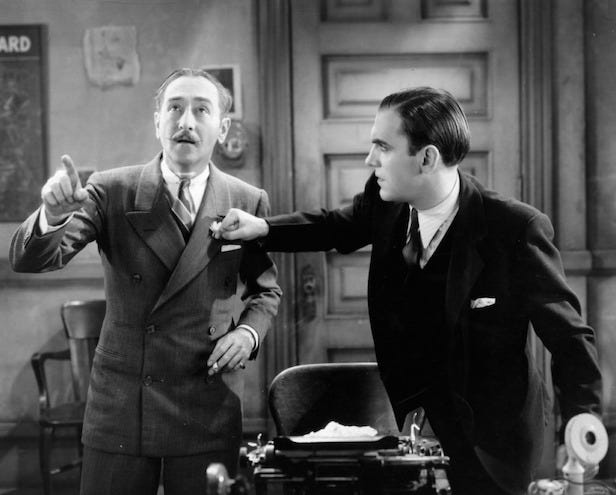
Fill In The Blank
How did we really feel about The Academy nominating this?
Ellen: I’d like to bequeath my watch to The Academy, but accuse them of stealing it shortly thereafter. From a filmmaking perspective, they were trying some interesting camera techniques and unexpected shots, and while they didn’t all look super great, I’m glad to see them playing with their new medium. From the story perspective, the best I can say is that it was interesting to have a look into this fast-talking, wise-cracking world. Unfortunately, (most) everyone was loud, unlikeable, and unscrupulous. It didn’t even really present it as a critique of the muckraking tactics and straight up making up stories: just a window into them. It’s bad enough that the remake, His Girl Friday, takes pains in the beginning to say that reporters today aren’t at all like these yahoos. Hildy’s priority is the story, not the truth, and while I can accept that ethos from a movie, it’s not going to endear me to an alleged journalist. Also Burns and Hildy said basically 80% of their lines in a yell, so for that reason: I’m out.
Tyler: I’d like to write a misleading headline about The Academy but also compliment it a few paragraphs into my story. I’ve got complicated feelings about this movie. As far as positives go, I do love some good media criticism (though I agree it could’ve been more direct) and the aforementioned weaving in of some political corruption/shenanigans as well. It also was NOT afraid to try some quite interesting (for better or worse) camera angles and shots, which is not something we typically see in movies from this era, so I appreciate it taking some big swings. Hell, I even related to Peggy’s frustration over her soon-to-be-spouse’s job getting in the way of their lives. (It gets better, Peggy!)
All that being said, there’s not a single likeable person in this movie. The closest I got to liking any of them was pitying poor Molly or Peggy, who are both underdeveloped as characters and are seemingly just a means to an end for the plot or the main characters. (Coincidence that they’re both women? Who can say.) As for those main characters, Burns would be a much more compelling anti-hero if he was more balanced between “anti” and “hero” but other than some allegedly genuine words of appreciation for Hildy, he’s mostly just using Hildy for his paper’s gain, feeding into Hildy’s borderline-addiction despite his many protests against it. Hildy is simply his weak pawn who doesn’t deserve the happy ending he’s given.
In all, as is alluded to in the sub-title, this movie crawled so Citizen Kane could run a marathon in record time.
Let The Credits Roll
Thanks for reading! Some quick housekeeping as you exit the theatre:
If you have plots and feelings of your own (on the movie or ILTBTA in general), feel free to comment on the post or simply reply to the email. If you liked reading this: tell your friends! If you hated reading this: tell your friends how much you hated it by forwarding it to them!
ILTBTA is on Letterboxd, the social networking/movie review site for movie fans. Follow us there to read our Spreadsheet comments of our ILTBTA movies, plus our ratings of other movies we watch!
If you’d like to start a wild Best Picture journey of your own, feel free to download a copy of The Spreadsheet. Bonus: checking off the boxes is oddly satisfying.
Post-Credits Scene
Get a sneak peek at the next ILTBTA installment.
Lace up your running shoes, because in honor of Ellen running the Cherry Blossom Ten Mile Run in just twelve short days, our next post will be the 1981 sports drama Chariots of Fire. The film tells the true story of two British runners competing in the 1924 Olympics while dealing with religious prejudice. Chariots of Fire is available to rent from pretty much all of those shiny rectangles in your smart TV.
Until then, support your local newspaper!
Seriously, he’s credited as just The Mayor.
A proto abnormal psychologist, not a NASA conspiracy theorist.
Sounds like my ex-wife!
That’s over $9,000 in today’s nest eggs!
Your authors can relate!
Results tabulated and certified by the accountants at Ernst & Yum™.




